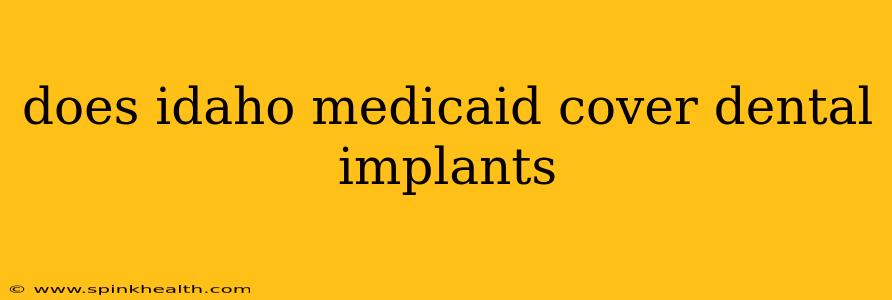Does Idaho Medicaid Cover Dental Implants? A Comprehensive Guide
The question of whether Idaho Medicaid covers dental implants is a common one, sparking anxieties and uncertainties for many residents. Let's unravel the complexities surrounding this issue, providing you with a clear and comprehensive understanding. The short answer is: no, Idaho Medicaid does not typically cover dental implants. However, the story doesn't end there. Let's delve into the details and explore the nuances of dental coverage under the Idaho Medicaid program.
Imagine Sarah, a single mother working hard to make ends meet in Boise. A recent accident left her with a damaged tooth, requiring extensive dental work. She's worried sick about the cost, wondering if Idaho Medicaid, her primary healthcare coverage, will help. Sarah's story, though fictional, highlights the anxieties many Idahoans face when dealing with dental emergencies or the need for significant dental procedures.
What does Idaho Medicaid cover for dental care?
Idaho Medicaid, like many state Medicaid programs, focuses on providing basic dental care for its beneficiaries. This typically includes preventative services such as:
- Cleanings: Regular checkups and professional cleanings are usually covered.
- Fillings: Treatment for cavities is generally included.
- Extractions: Removing severely damaged or decayed teeth is often covered.
- Basic dentures: In some cases, basic dentures may be covered, although this varies depending on individual circumstances.
However, the coverage specifically excludes many more extensive and costly procedures, including dental implants.
Why doesn't Idaho Medicaid cover dental implants?
The exclusion of dental implants from Idaho Medicaid coverage stems from several factors:
- High Cost: Dental implants are a significantly expensive procedure, requiring specialized materials, skilled professionals, and often multiple visits. Including them in the Medicaid program would strain its budget significantly.
- Resource Allocation: Medicaid programs must carefully allocate limited resources to prioritize essential healthcare services. They prioritize treatments deemed medically necessary to maintain overall health and well-being, while elective procedures like cosmetic dentistry or implants are often excluded.
- Alternative Treatments: Medicaid programs often prioritize less expensive, yet effective, treatment options, such as dentures or bridges, before considering more complex and expensive treatments like implants.
What are the alternatives to dental implants covered by Idaho Medicaid?
If dental implants aren't an option under Idaho Medicaid, what are the alternatives? Idaho Medicaid may cover:
- Dentures: These are removable appliances that replace missing teeth.
- Bridges: Bridges are fixed appliances that replace missing teeth, usually supported by adjacent teeth.
- Partial dentures: These are removable appliances that replace some, but not all, missing teeth.
Are there any exceptions to the Idaho Medicaid dental implant coverage?
While unlikely, there might be exceptional circumstances where Idaho Medicaid could consider covering part of the cost of dental implants. This would depend heavily on specific medical necessity, potentially involving severe medical complications resulting from tooth loss. Such situations would require thorough documentation and justification from a dentist and possibly other specialists.
How can I find out more about my specific Idaho Medicaid dental coverage?
The best way to determine your specific coverage is to directly contact the Idaho Medicaid office or your case manager. They can provide precise details on what procedures and services are covered under your specific plan. Don't hesitate to ask detailed questions to ensure you understand your options and limitations.
What financial assistance programs are available for dental implants in Idaho?
For those not covered by Idaho Medicaid, several other financial assistance options might be available:
- Dental financing plans: Many dental offices offer in-house financing plans or work with third-party financing companies.
- Dental discount programs: Various programs offer reduced rates on dental services.
- Local charities and non-profit organizations: Some organizations provide financial assistance for dental care to low-income individuals.
Navigating the complexities of dental insurance and Medicaid can be overwhelming, but by understanding the specifics of your coverage and exploring available resources, you can find solutions that meet your needs and budget. Remember, seeking professional guidance is crucial to making informed decisions about your oral health.

